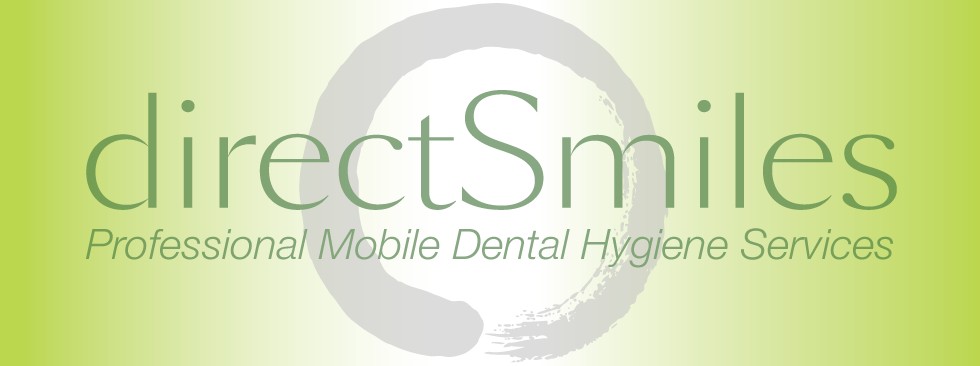
Professional Mobile Dental Hygiene Services
Serving Greater Toronto and Surrounding Areas

directSmiles is a professional mobile dental hygiene service bringing quality dental hygiene care directly to you—the client. Our company’s on-site approach to the delivery of dental hygiene services was developed in response to the great and growing need for improved access to preventive and therapeutic oral health care in our communities.
About Us at directSmiles
directSmiles is owned and operated by two very dedicated and experienced Registered Dental Hygienists:
Cheryl Kiryk, RDH has practiced dental hygiene in Ontario since 1995. Cheryl, also a registered restorative dental hygienist has provided services in private dental practice settings including periodontics and general dentistry. Cheryl speaks English and French fluently, allowing her to reach diverse cultural communities.
Our Mission at directSmiles
At directSmiles, we aim to bring down barriers to quality, and client-focused oral health care through increasing access to dental hygiene services. With open minds, listening ears and bright smiles, we bring our services directly to you.
Services at directSmiles
At directSmiles, each client receives an assessment of all factors that impact his or her oral health. This includes a comprehensive review of the client’s medical and dental history. Together with the client, we determine and prioritize oral health needs. It is based on these needs that we plan treatment and develop individualized goals for our clients.
• Oral Health Assessment
• Scaling / Debridement
• Polishing / Stain Removal
• Teeth Whitening
• Denture Care (cleaning and labeling)
• Oral Health Education
• Desensitizing of Teeth
• Fluoride Treatments
• Custom Fitted Sports Guards
• Referrals (to other health professionals)
Health at directSmiles
As primary oral health care providers and educators, we recognize the important connection between your oral and general health. Scientific evidence indicates that poor oral health is linked to heart disease, stroke, osteoporosis, complications in the management of diabetes and increased risk of aspiratory-pneumonia for the immune compromised. Additionally, studies suggest that pregnant women with gum disease are more likely to have low birth-weight babies. We also know that problems in your mouth can diminish chewing ability and result in inadequate digestion and nutrition. Good oral health also enhances the beauty of your smile and reduces halitosis. Improving your oral health will boost your confidence as well as overall health.
Facilities at directSmiles
Our Equipment: Our equipment is compact, portable and brought directly to you. Our mobile unit includes a client chair, small quiet compressor, suction unit, light, instruments and polishers. Minimal physical space is required allowing us to bring our services to numerous settings and accom-modating individuals with personalized needs.
Infection Control: At directSmiles, infection control is an important and serious component of our standard of practice. All clinical procedures along with cleaning, disinfection, and sterilization of equipment and instruments are performed with strict adherence to our infection control protocol developed from guidelines set out by the Centre for Disease Control and the Canadian Dental Association.
Seniors at directSmiles
Seniors comprise a large and growing group of clients at directSmiles with very unique oral health care needs. Advancing age, along with common chronic conditions such as cardiovascular disease, stroke, diabetes, arthritis, cancer, Parkinson’s and Alzheimer’s disease, may bring about many changes in the oral cavity. At directSmiles, we dedicate ourselves to continued learning, researching, and educating the client, care-providers and their families on the many facets of geriatric oral health.
Dry Mouth Syndrome: This condition, common among seniors is associated with normal changes of advancing age. Other causes include the use of prescription medications such as blood pressure pills, diuretics, sleeping pills, anti-depressants, and anti-histamines. Radiation and Chemotherapy used in the treatment of cancer is another prime source for dry mouth. Some chronic conditions including diabetes, and Parkinson’s disease are also associated with decreased production of saliva.
Treating Dry Mouth Syndrome: Many commercial oral care products will contain ingredients that can aggravate dry mouth. It is best to avoid brands of toothpastes containing foaming agents such as sodium lauryl sulfate and mouthrinses that contain alcohol. Your oral health care professional will be able to recommend choices of oral care products suitable for dry mouth. Other tips to alleviate this condition include sipping on water or keeping small chips of ice in the mouth. The use of artificial saliva to moisten the mouth or use of sugarless gums to stimulate salivary flow is also useful.
Cavities: Seniors are at increased risk for the development of cavities or dental caries. Many of these carious lesions or cavities tend to occur along the root surfaces of the teeth and may progress rapidly. Decreased salivary flow along with diets high in simple sugars and inadequate oral hygiene resulting from poor manual dexterity with the toothbrush and floss are common contributing factors to cavities.
Preventing Cavities: The primary cause of dental caries is plaque bacteria found on the surfaces of the teeth. A healthy and balanced diet rich in fruits, vegetables, grains, dairy and protein is preferred to one that is filled with processed sugars when it comes to prevention of cavities. Toothpaste and mouthrinses containing fluoride have also been proven to help remineralize weakened surfaces of the teeth. Daily removal of plaque bacteria with brushing and flossing of the teeth in addition to professional dental cleanings are also important components of a good caries prevention program. As seniors are at increased risk for cavities, regular exams or assessments for caries with your dental professional are essential for good oral health.
Newsletters at directSmiles
directSmiles' newsletters are called Dental Hygiene times. The news letters contain relavent issues on your health as viewed from a dental hygiene perspective.
Click on the newsletter image to view in a PDF.
You may download the PDF newsletters and distributed them in whole as you wish under the Creative Commons Licience.
These PDFs are best viewed with abobe Acrobat version 6 or later.
To download click on the Adobe icon to the right.

To subscribe to our newsletter, click here

subscribe
Printed copies of our newsletters may be provided to certain organizations and institutions. Please contact us.
Issue 01 2009 Dental Hygiene Times
Oral Health and Total Health
We cannot say we are totally healthy unless each and every part of our bodies is functioning at their optimum. Science has recently begun to uncover some very important connections between oral health and overall systemic health. We are just now beginning to understand that a healthy mouth is related to a healthy body.
Issue 02 2009 Dental Hygiene Times
Your Dentures …Your Teeth…Your Smile
When we mention the term “Dentures” most people think of the elderly and aged. Although more prevalent among seniors, denture-wearers are found across all age groups and segments of society. Dentures are often a popular choice for those wishing to replace missing teeth and return to full-functioning dentitions.
Issue 03 2009 Dental Hygiene Times
Achieving a Beautiful Healthy White Smile
As professional dental hygienists, we’re frequently asked: “How do I achieve a beautiful smile?”…. “Why are my teeth not as white as I’d like them to be?”… “Are there things I can do to improve the appearance of my teeth?” These questions don’t surprise us since we know your smile speaks volumes about you and who you are. Culturally, we relate aesthetically pleasing teeth and gums to attributes such as youth, vitality, health, energy and even personal hygiene. A healthy smile is also a great confidence booster; after all, who wouldn’t smile more if they knew they had a brilliant healthy smile?
Issue 04 2009 Dental Hygiene Times
Alzheimer’s Disease…and Oral Health
Alzheimer’s Disease is a progressive, degenerative condition of the brain is a common form of dementia involving 3%-10% of the population over 65 years and up to 50% of those over 85 years. Mainly characterized by active declines in memory, judgment, language, and motor skills, these diminished abilities are associated with abnormal development of plaquelike deposits (senile-plaques) and knots (neuro-fibrillary tangles) along the brain’s neuroaxons. Alzheimer’s can challenge your family and caregivers in multiple aspects of daily life-- including the provision of oral hygiene care for your affected family member.
Issue 05 2009 Dental Hygiene Times
Diabetes and Your Oral Health
Diabetes Mellitus is a physical condition involving impairment in the breakdown of sugars, fats, and proteins. It is caused by abnormal production or use of insulin by the body. Although diabetes affects all age groups, it’s more prevalent in those of us 45 yrs and older and more common among people of African, Asian, and Hispanic origin. The incidence of diabetes is on the rise in North America due in part to an aging population. The National Centre for Health Statistics in the United States estimates that 221 million people worldwide will be diagnosed with diabetes by the year 2010. Medical professionals tell us that prolonged, elevated levels of blood sugar caused by this condition can result in damage to our eyes, nerves, kidneys and heart in addition to delays in wound healing. In recent years, we’ve discovered that diabetes can have various oral implications as well.
Issue 06 2009 Dental Hygiene Times
Gum Disease and Oral Hygiene
Gum disease is one of the most common oral health problems affecting the population. Many of us have or will experience some form of this condition during our lives. Gum disease often progresses silently and slowly without any discomfort or pain in the early stages. The chief culprits of gum disease in all cases are the bacteria found in dental plaque and tartar. These bacteria are known to cause destructive inflammation of the gums and other supporting structures primarily the bone surrounding the teeth. Left untreated, mild forms of gum disease can progress into more serious infection resulting in tooth loss. Although severe manifestations of this condition are mostly seen in adults, children can be affected by less aggressive forms of gum disease. The good news is that gum disease is preventable, treatable, and its effects reversible if treated early.
Issue 07 2009 Dental Hygiene Times
Parkinson’s Disease…and Oral Health
Parkinson’s Disease is a degenerative condition affecting our body’s nervous system. Caused by declines in the production of the brain chemical dopamine, the primary symptoms of this complex disorder are characterized by dysfunctions in muscle reaction and movement such as muscular rigidity, tremor, slowness and weakness. Other symptoms of Parkinson’s disease may involve changes in our ability to think, reason and remember. This debilitating condition mainly affects the middle and elderly age groups of our population. Those with Parkinson’s disease as well as their caregivers and family members often face daily life challenges that include the proper and adequate provision of oral hygiene care.
Dental Hygiene Times
directSmiles is dedicated to the continued education of our clients. Please visit us often as we continue bring you the latest on what’s new in oral health.
At directSmiles, we want to connect with the community. We are proud to sponsor the Caledon Soccer club. This year it's a girls 12 to 14 year old team. We are glad to announce the team won the championship.
Updated on
September 16, 2010

